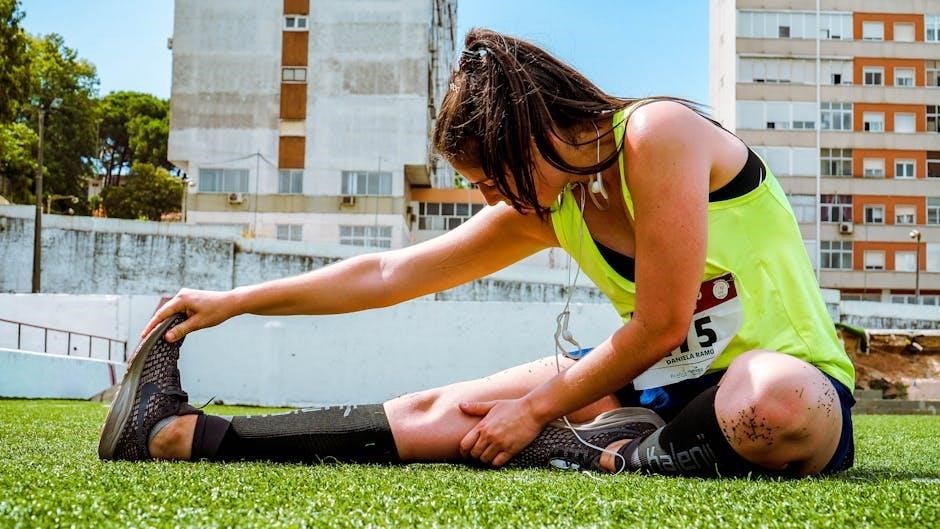A well-structured marathon training nutrition plan is essential for optimizing performance, endurance, and recovery. It focuses on balancing carbohydrates, proteins, and hydration to fuel your body effectively during intense training sessions.
1.1 Understanding the Importance of Nutrition in Marathon Training
Nutrition plays a cornerstone role in marathon training, directly impacting performance, endurance, and recovery. A tailored plan ensures proper fueling, prevents fatigue, and supports muscle repair. Balancing carbohydrates, proteins, and hydration is crucial to maintain energy levels and optimize training efficiency. Proper nutrition also helps minimize the risk of injuries and enhances overall race preparation, making it a vital component of a successful marathon training regimen.
1.2 Key Principles of a Marathon Training Nutrition Plan
A successful marathon training nutrition plan revolves around personalized fueling strategies tailored to training load, goals, and individual needs. Key principles include balancing macronutrients, prioritizing high-quality carbohydrates for energy, and ensuring adequate hydration. Consistency, timing, and adjusting intake based on training intensity are also critical. A well-structured plan supports endurance, recovery, and performance, helping athletes adapt to the demands of training and prepare for race day effectively.

Pre-Run Nutrition
Pre-run nutrition is crucial for energy and performance. Aim for a balanced meal rich in carbs and protein, 1-3 hours before training, to optimize fuel availability.
2.1 Timing and Composition of Meals Before Training
Timing meals 1-3 hours before training ensures optimal digestion and energy availability. Prioritize balanced meals rich in complex carbs and lean proteins, such as oatmeal with fruit or whole grain toast with eggs. Avoid heavy, high-fiber, or fatty foods to prevent digestive discomfort. Hydration is also key, so drink water or a sports drink 30 minutes before starting. Adjust meal timing based on your schedule, especially if running in the morning, when breakfast should provide 30% of your daily calorie intake.
2.2 Carbohydrate Loading and Protein Balance
Carbohydrate loading is crucial for maximizing glycogen stores, typically in the final days before a marathon. Focus on complex carbs like whole grains, fruits, and vegetables, while reducing fiber intake to avoid digestive issues. Protein intake should be balanced to support muscle repair, with runners requiring 50-75% more than non-runners. Aim for high-quality sources like lean meats, fish, or plant-based options. This combination ensures energy availability and muscle recovery, optimizing performance and reducing fatigue during training.

During Run Nutrition
During runs, prioritize hydration and electrolyte balance to prevent dehydration. Consume gels, bars, or sports drinks to maintain energy levels, especially in long-distance training sessions.
3.1 Hydration Strategies for Optimal Performance
Proper hydration is crucial for performance and preventing dehydration. Aim for 400-800 ml of water or sports drinks 1-2 hours pre-run. During runs, consume 300-600 ml every 20-30 minutes, including electrolytes to replenish lost salts. Adjust intake based on sweat rate and weather conditions. Monitor urine color to ensure hydration levels are adequate.
3.2 Fueling During Long Runs: Gels, Bars, and Drinks
Fuel your long runs with a mix of gels, bars, and sports drinks to maintain energy levels. Consume 30-60 grams of carbs per hour, starting 20-30 minutes into your run. Opt for easily digestible options like energy gels or fruit-based bars. Sports drinks provide both carbs and electrolytes, essential for hydration and preventing cramps. Experiment with products during training to avoid GI issues and ensure they meet your nutritional needs for optimal performance.

Post-Run Nutrition
Post-run nutrition is vital for recovery, focusing on refueling with carbohydrates and protein to repair muscles and replenish energy stores, while also rehydrating effectively.
4.1 Recovery Nutrition: Refueling and Rehydrating
Recovery nutrition is crucial for replenishing energy stores and repairing muscles post-run. Aim to refuel within 30-60 minutes with a mix of carbohydrates (30-60g) and protein (15-30g) to promote muscle recovery and glycogen replenishment. Prioritize hydration by consuming water or electrolyte-rich drinks to restore fluid balance. Avoid alcohol and caffeine, which can hinder hydration. A balanced recovery meal or snack supports overall performance and reduces muscle soreness, ensuring your body is ready for the next training session.
4.2 The Role of Protein in Muscle Repair and Recovery
Protein is vital for muscle repair and recovery, particularly for runners. It helps rebuild and strengthen muscle fibers damaged during training. Aim for 1.2-1.6g of protein per kilogram of body weight daily, consumed in evenly spaced meals. High-quality sources like lean meats, fish, eggs, and legumes are ideal. Protein intake after runs, especially within 30-60 minutes, supports muscle synthesis and reduces soreness, enabling faster recovery and improved performance in subsequent training sessions.

Sample Meal Plan and Timing
A well-structured meal plan balances carbs, proteins, and hydration. Include a balanced breakfast 2-3 hours pre-run, mid-run snacks with carbs/protein, and a recovery meal post-run.
5.1 Structuring Meals Throughout the Day
Structuring meals throughout the day is crucial for sustained energy and recovery. Start with a balanced breakfast containing 30% of daily calories, including carbs and protein. Mid-morning snacks should offer a mix of carbs and electrolytes. Lunch should focus on complex carbs, lean proteins, and vegetables. Pre-run snacks should be light but energy-rich, while post-run meals emphasize recovery with protein and carbs. Dinner should include balanced portions of protein, healthy fats, and fiber-rich foods to support overnight recovery and prepare for the next day’s training.
5.2 Example Meal Ideas for Runners
Example meal ideas for runners include oatmeal with banana and nuts for breakfast, whole-grain wraps with lean turkey for lunch, and quinoa salads with avocado for dinner. Snacks like energy bars, fruit, or yogurt with honey are ideal for quick energy. Pre-run meals could be toast with peanut butter, while post-run recovery meals might feature smoothies with protein powder, berries, and spinach. These meals balance carbs, proteins, and fats to fuel performance and aid recovery.

Hydration and Electrolyte Management
Proper hydration and electrolyte balance are crucial for maintaining performance and preventing dehydration. Aim to drink water regularly, and consider electrolyte-rich beverages during long runs to replenish lost salts.
6.1 Importance of Proper Hydration
Proper hydration is vital for maintaining bodily functions, regulating body temperature, and transporting nutrients during marathon training. Even mild dehydration can impair performance, leading to fatigue, dizziness, and muscle cramps. Staying hydrated helps sustain energy levels, supports endurance, and promotes recovery. Aim to drink water regularly throughout the day, with increased intake before, during, and after runs. Monitoring urine color can help ensure you’re adequately hydrated, as pale yellow indicates proper hydration. Prioritizing hydration strategies is essential for optimal performance and overall health.
6;2 Managing Electrolyte Levels During and After Runs
Electrolytes, such as sodium, potassium, and magnesium, are crucial for maintaining fluid balance and nerve function during marathon training. Sweat loss disrupts electrolyte levels, potentially causing cramps and fatigue. During long runs, consider consuming electrolyte-rich drinks or supplements to replenish lost salts. Post-run, incorporate foods high in electrolytes, like bananas for potassium or coconut water for sodium, to restore balance. Monitoring electrolyte levels ensures optimal performance and prevents dehydration-related issues, supporting overall recovery and training efficiency.

Nutrition for the Final Week Before the Marathon
During the final week, focus on carb-loading to maximize glycogen stores while reducing training intensity. Ensure balanced meals with quality carbs and proteins to fuel your body effectively for race day.
7.1 Carb-Loading Strategies
Carb-loading is a critical strategy in the final days before a marathon to maximize glycogen stores, enhancing endurance and performance. Start 2-3 days prior, increasing carbohydrate intake to 8-10 grams per kilogram of body weight. Focus on low-fiber, easily digestible carbs like whole grains, fruits, and vegetables. Pair this with reduced training intensity to optimize energy stores. Proper hydration is also essential to avoid stomach discomfort. Aim to balance carbs with protein to maintain muscle function and overall nutrition balance.
7.2 Tapering and Nutrition Adjustments
During the final week before the marathon, tapering your training while adjusting nutrition is crucial. Reduce your calorie intake slightly to match lower energy expenditure, but maintain carbohydrate levels to preserve glycogen stores. Include moderate protein portions to support muscle repair and recovery. Stay hydrated by drinking plenty of water and consider adding electrolytes to prevent imbalances. Avoid introducing new foods to minimize digestive discomfort. This balanced approach ensures you reach race day feeling rested, fueled, and ready to perform at your best.
Protein Intake for Runners
Runners require 50-75% more protein than non-runners to repair muscle tissue and support recovery. Aim for 1.2-2.0 grams per kilogram of body weight daily.
8.1 Increased Protein Requirements
Runners require 50-75% more protein than non-runners due to the muscle stress caused by repetitive impact during training. Aim for 1.2-2.0 grams of protein per kilogram of body weight daily.
Timing is crucial; consume protein within 30-60 minutes post-run to aid muscle recovery and repair. Prioritize high-quality sources like lean meats, fish, eggs, and plant-based alternatives for optimal results.
8.2 Sources of High-Quality Protein
High-quality protein is essential for muscle repair and recovery in runners. Opt for lean animal-based sources like chicken, turkey, fish, and eggs, as well as plant-based options such as tofu, legumes, and quinoa. These foods provide essential amino acids necessary for tissue repair and growth.
Incorporate a variety of protein-rich foods into your meals to ensure a balanced intake. Pair plant-based proteins with whole grains or nuts to enhance amino acid completeness, supporting overall training and performance.

